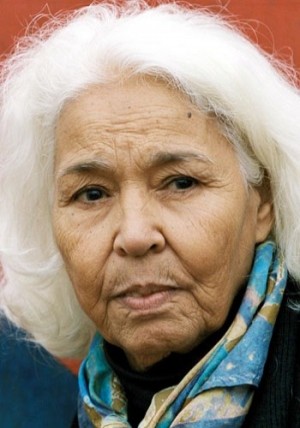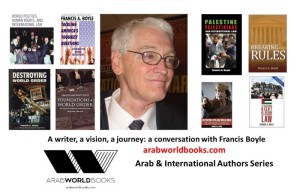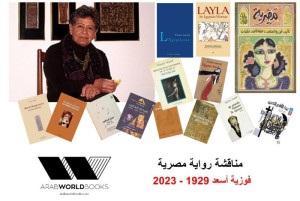Nawal El Saadawi
11 September 2003 Portland, Maine, USA
I. What do we mean by the word "terrorism"?
Today is the eleventh of September 2003, the anniversary of the attacks launched against the World Trade Center and the Pentagon. On this day I am at my desk on Peaks Island in Maine writing my intervention for the conference entitled "Fighting Terrorism for Humanity." The invitation to this conference was sent to me by the Prime Minister of Norway "Kjell Magne." I have heard that amongst those who will attend this conference are a number of the Heads of State including the president of the United State "George W. Bush." I have also been told that the General Secretary of the United Nation organization "Kofi Annan" will open the conference on the morning of September 22, 2003.
In front of me are the morning newspapers of Portland Maine, which lies on the northern most part of the Atlantic coast in the United States. I came to Portland at the beginning of last January as a visiting professor at the University of Southern Maine for one academic year.
The main headline of the Portland Press Herald says "President George Bush declares that there is a need to extend police powers in order to fight terrorism." This declaration was made on the occasion of the second anniversary of the September 11 attack. He explained that Patriot Act I issued in 2001 was insufficient to fight against "terrorism" and that new measures were necessary, measures which would permit the withdrawal of United States citizenship from people "suspected of having some relationship with terrorism," to prevent the leakage of any information concerning individuals arrested and put in prison or suspicion without trial or legal proceedings, to allow the analysis and registration of their DNA characteristics, help to obtain detailed information about matters which might concern their intimate and private life, abolish bail in proceedings as a way of legal release, and engage in police arrests without subpoenas from the courts.
These measures envisioned as effective ways in the fight against terrorism, are they not in themselves of a "terrorist" nature, a reflection of a "terrorism" imposed by the State, by the rulers of the United States in the name of their "war against terrorism"? Perhaps that is why they are meeting with a mounting opposition from law makers in the Republican and Democratic parties, from political and academic institutions, from peoples organizations and associations for whom issues related to democracy and the loss of civil liberties are becoming a growing concern.
If the policies being implemented by the United States administration are shot through with an increasing violence against the American people said to be needed in order to ensure their "protection against future terrorist attacks" and maximize "internal security" would it be surprising if the violence exercised against other poorer, weaker peoples in the world is reaching the proportions we are witnessing today in the so called "war against terrorism" and the "spread of democracy"?
I keep wondering how the military intervention and occupation first of Afghanistan, then of Iraq can further "the fight against terrorism for humanity." How the increasing death and destruction meted out to the Afghani and Iraqi people can quell the fires of hatred or, dissipate the desperation which helps to fuel the loss of faith in collective, democratic action. I wonder why the killing of Palestinian men, women, and children by a regular technologically, nuclear, laser equipped army continues to be qualified as self defense, why military invasion and mass massacres by "coalition troops" are not described as "terrorism" but as civilizing, democratizing missions meant to free our world of the "Bin Ladens" who have arisen, and continue to arise in different parts of the world.
Could it be that all these forms of "violence" and "terrorist" in nature, that a more powerful "terrorism" has helped to create a far less powerful one, that they are locked in a struggle that nurtures and maintains both of them, and that in order to "fight terrorism for humanity" we need to fight both of them to expose this circle of violence? Could it be that we are and have always been the victims of "language" and of "terms" set by the more powerful so that a "terrorism" exercised by the state internally, or a military invasion and occupation of another country becomes a part of the "fight against terrorism for humanity or democracy," that only the opponent who has recourse to more individual "terrorism," who throws bombs, or blows himself or herself up to kill others is qualified as "terrorist"?
That is why when I think of the crime against humanity perpetrated by the "terrorist" attack on the world Trade Center and the Pentagon on September 11, 2001 which led to the death of 3,000 people, I remember that on September 11, 1973 the coup engineered by circles, certainly known to the members of this conference, against the regime of Allende in Chile led to the death of more than 30,000 people under Pinochet, and ask myself why human lives should have a different value according to where they live?
II. Is resistance to foreign occupation considered "terrorism"?
What I have said brings me to another point. I come from the Arab region, from Egypt. For over half a century I have lived with the nightmare of the Israeli Palestinian conflict. Israel for years has waged a war against the Palestinian people. It has been a war waged by a regular army equipped with the most sophisticated weapons, with the help mainly of the United States, including an uncounted number of nuclear or hydrogen bombs, against a people with no army, and no weapons to speak of, against a people whose children and youth fight tanks and rockets and Apache helicopters and Phantom planes with stones. As a result "terrorist" responses have grown in the struggle waged by the Palestinian people for a land of their own, for what is left of a land which was once their own. This is a struggle for a place in which to live, for life against death or a living death.
On the one hand we have Israeli occupiers demolishing homes, uprooting olive trees, building an apartheid prison wall, establishing settlements on land which is not theirs, killing, maiming, destroying. On the other a helpless people many a time driven to desperation, fighting to liberate themselves from foreign occupation. On the one hand we have military aggression, on the other self-defense, a right recognized by the international and national law, the right to defend life, means of sustenance, water, home. How under such circumstances can I equate the Israeli soldier who harasses, and hunts, and shoots, and destroys at every moment to take over what is not his, with a young man, or a young woman who humiliated, and hungry, and hopeless is brought to end her life by blowing herself up in order to kill those whom she perceives as the source of her misery and as the occupier.
I have always been, and continue to be against "violence" against "terrorism" in all its forms. But I must understand what is going on around me, what motivates people to act as they do, what interests are involved. If I want to "fight terrorism" for humanity I cannot equate the occupier with the occupied, the aggressor with the aggressed, the oppressor with the oppressed. I cannot forget the powerful multinational oil interests that were an important reasons for the invasion of Afghanistan and Iraq, nor the capitalist fundamentalist interests behind Bush/Cheney/Rumsfeld/ Wolfwotiz's "War on Terror," nor the radical ruling class fundamentalist Wahhabite Seoundi interest behind Bin Laden and his "Quaida" organization after his alliance with the United States broke down when the war against the Soviet Union in Afghanistan was over. Where as the young Palestinian girl Ayab Al Akhrass blew herself up at an Israeli checkpoint in the struggle against the occupiers of her land, and the daily humiliation suffered at their hands. Knowing that men and women can sometimes just in defense of their human dignity prefer suicide rather than surrender.
Fleeing survivors of military occupation or terrorism usually look upwards at the sky for help. The sky is always silent and passive. It drives them towards individual action.
Suicide bombers are looked upon as terrorist or fanatic religious people. However, they are in most cases products of state military and police terrorism, whether Christians, Muslims, Jews, Hindus or others. They are people that suffered extreme grievances and violence which culminate in suicide bombing, as a sign of complete desperation, and loss of hope for any just solutions to their sufferings.
In any case the American and Israeli military occupation forces do not have any moral or human highground over suicide bombers in Palestine, Iraq, Afghanistan or other countries.
III. Why Terrorism in our age?
"Terrorism" is not a new development. It has existed throughout the ages, has been bred and nurtured by injustice and oppression, and is linked to extremism, whether racial, sexual, political or religious. Often it is a combination of more than one extremism.
However, the most common form of "terrorism" visible in our recent modern and post-modern times is that related to religious fundamentalism entrenching itself in different parts of the world including Asia, the Arab countries, Israel, the United States etc.
The question which here arisen is why at the end of the twentieth century and the beginning of the twenty first century there should be this wave of religious fundamentalism accompanied by anti-democratic "terrorist" extremism and violence? Why in this age of technological progress (linked especially to information and communication) and the tremendous possibilities it offers to the humankind should there be this retrograde movement towards religious (and racial) fundamentalism accompanied by "terrorist" activities.
Perhaps the answer to this question lies in the fact that despite the progress attained on many fronts in this so called "age of globalization" technological progress not only has failed to solve the difficulties faced by the vast majority of people in the world, but that during the past decades they have tended to grow more serious. With the falling rate of profit in the real economy and under the pressure of technological competition the multi-national companies in control of the world economy have launched an offensive. Only one third of the world economy is related to the real, that productive economy. The other two thirds are involved in paper investments, in speculations and financial operations. The gap between the rich and the poor is growing. Where if poverty has decreased in some parts of the so-called South it is still widespread and rampant. Unemployment is on the rise (800 million according to ILO figures) social security is shrinking, social services where they exist are becoming more expensive, currency values are dropping in mot countries as a result of inflation. The social, economic, educational, health and cultural conditions of people in the world are witnessing a steady deterioration. The hopes of people in the countries of the South have been dashed to the ground after they attained a fictitious independence in which their economy remained subservient to the multi-nationals controlling the "Free Market" and "Free Trade". They are riddled in debt and "foreign investment" or "structural adjustment" operating across their boundaries has pumped money out rather than in through "Free Trade" (which is not free). Socialism as practiced in the once upon a time "second world" collapsed leaving its countries a prey to predatory mafias. In Europe and the United States people are wondering what had happened to their "democratic way of life," to their "democratic impact" on the future of society. They are confused, uncertain, insecure.
In such an atmosphere many seek solace and comfort in religion, hence the religious revival. Religion had always been used for political purposes, and this together with the revival explains the growth of fundamentalist forces. In India a Hindu fundamentalism rules. In the United States a neo-conservative, neo-liberal capitalist and fundamentalist ruling group holds the reins of power. In Asia and in the Arab countries Islamic fundamentalist movements have grown. In Israel Sharones likud(?) and his coalition partners in government are largely fundamentalist.
Fundamentalism breeds "terror" whether in the state or amongst political and social movements. It breeds "terror" and terrorist responses to "terror". It breeds a hatred of democracy, and a love for control, necessary to dominate and pacify the growing masses of restive people at home, and abroad. Fundamentalism is the refuge and ally of the corporations, for in "God they trust" to lead people blindfolded, to make them resigned and humble towards powers they cannot control. Fundamentalism helps them to create conflict where needed, to "divide and rule". It is an excuse for violence, and militarism and war, since Satan must be fought, and Satan is everywhere in Baghdad, in Pyongyang, in Tehran and in about sixty countries where terrorism has chosen to lie low.
IV. How can we fight Terrorism for Humanity?
1.By fighting war. War is the central issue in the world of today. If peace prevails, conflicts and violence and "terrorism" will cease to grow. Slowly but surely nations and people will find it easier to learn to live side by side, engage in dialogue, turn their attention to solving the problems facing the world. Fundamentalist "terrorist" ideologies will wither away, and more security will prevail. Rulers and politicians will no longer easily find excuses to sponsor Patriot Acts, to attack civil liberties and human rights, to restrict the democratic participation of people in mapping and deciding the present, and the future of their societies, of their world and where it goes. In the absence of war invasion and occupation of other countries will no longer be feasible and the militarization of the United States, which buttresses its economic clout will shrink more and more. If peace prevails economic policies can change. Instead of money spent on arms, money will go to houses, to hospitals, to schools, to production of goods, to wages and social benefits instead of pouring into the coffers of multinationals working to produce arms, and into the media beating the drums of violence and discord and war. In the absence of war violence of all kinds against women and children, minorities and races, will no longer be as easy as before. In the absence of war scientific research will move away from weapons of mass destruction, from rockets and planes and warships, to making the environment healthy, preserving the riches of nature, to the development of welfare, and health and knowledge. In the absence of war the democratic evolution of society will move forward.
I say that if we really want to fight terrorism for humanity we must begin to fight war with determination, to mobilize people for peace and justice. And to do this we must help them to see all the economic, political, social and cultural consequences of the policies of a ruling minority in the world who can only maintain their power through aggression, militarization, and war.
2. To fight war nuclear weapons should be banished completely. This view is endorsed by the United Nations General Assembly and is enshrined in the Non-Proliferation Treaty which was signed by 187 nations. All countries in our region signed this treaty except Israel.
Israel continued to develop its nuclear weapons secretly, although it was common knowledge even before Mordechai Vanum's disclosures, published by the Sunday times on 5th October 1986.
The acquisition of nuclear weapons by one country would induce other countries to acquire these weapons, to bring the nuclear asymmetry to an end. The development of nuclear weapons by the United States and Israel encourages others to follow suit, as a means of protection, against possible attacks from them, especially after the policy of preventive strikes have been endorsed by the Bush administration. Therefore the only solution is to enforce nuclear disarmament on all countries without exceptions.




